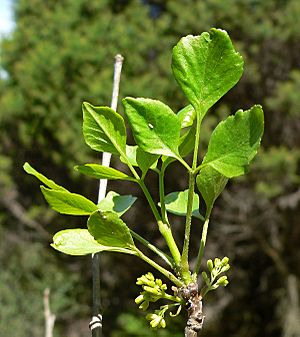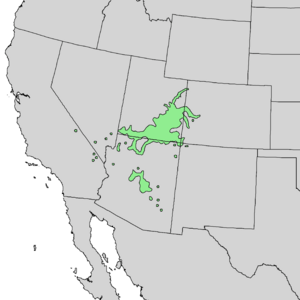Single-leaf ash facts for kids
Quick facts for kids Single-leaf ash |
|
|---|---|
 |
|
| Scientific classification | |
| Genus: |
Fraxinus
|
| Species: |
anomala
|
 |
|
| Where Fraxinus anomala grows naturally | |
The Fraxinus anomala is a special kind of ash tree. People often call it the single-leaf ash. It grows naturally in the southwestern United States and northern Mexico. You can find it in many different places, like dry deserts and chaparral areas. This tree is unique because some of its leaves are simple, meaning they are just one leaf. Most other ash trees have leaves made up of many smaller leaflets.
Contents
What Does the Single-Leaf Ash Look Like?
The single-leaf ash can be a shrub or a small tree. It can grow up to five or six meters tall, which is about 16 to 20 feet.
Leaves and Flowers
Its leaves can be simple (one leaf) or compound (made of up to five smaller leaflets). Each leaflet is usually round or oval-shaped. They might have small teeth along their edges. The tree's flowers are not very noticeable. They are brownish and do not have petals.
Fruit of the Tree
The fruit of the single-leaf ash is flat and called a samara. It can be up to two centimeters long and one centimeter wide. When the fruit is young, it is green. As it gets older, it turns tan or brown. These samaras often hang in bunches on the tree.
Where Does the Single-Leaf Ash Grow?
The single-leaf ash is found in several parts of North America.
In the United States
In Arizona, you can see it along the Arizona transition zone of the Mogollon Rim. It also grows in the Grand Canyon in northern Arizona. From there, its range goes into southern and southeastern Utah. Utah is where most of these trees grow.
The tree's range also reaches into parts of western Colorado. You can find it near the Colorado and Dolores Rivers. It also grows near the shorter Yellowjacket and McElmo Rivers in the very southwest of Colorado. In the Mojave Desert of California, it lives in special sky island chaparral and woodland areas. You can also find smaller groups of these trees in southern Nevada and southern Wyoming.
See also
 In Spanish: Fraxinus anomala para niños
In Spanish: Fraxinus anomala para niños

